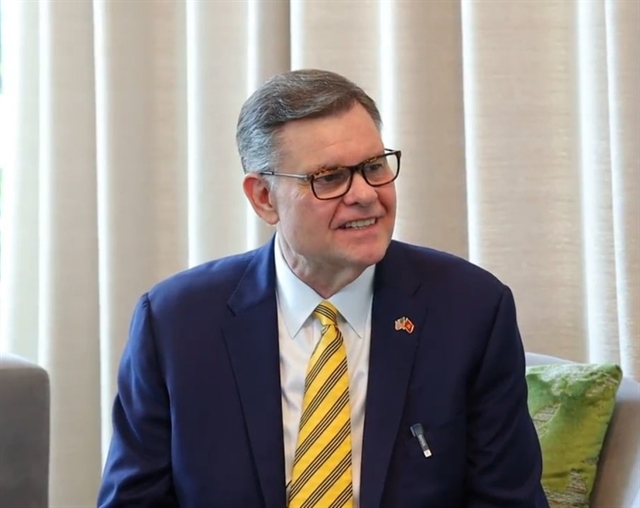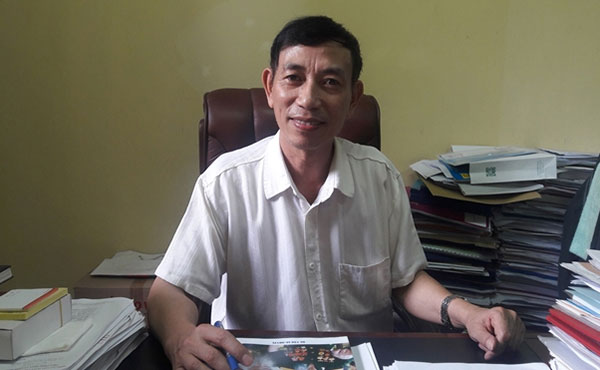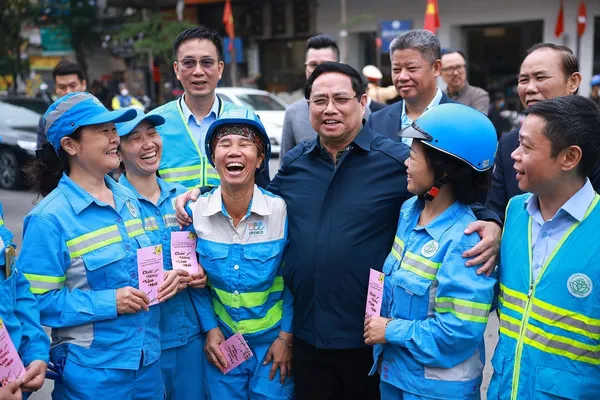 |
| Deputy Prime Minister and Minister of Foreign Affairs Bùi Thanh Sơn. — VNA/VNS Photo Phương Hoa |
Deputy Prime Minister and Minister of Foreign Affairs, Bùi Thanh Sơn, talks to the press about Việt Nam's diplomatic achievements over the past year and outlined the direction of Việt Nam’s foreign policy as it enters a new era.
Could you please share your overall assessment of Việt Nam’s diplomatic landscape this year?
The global situation continued to be marked by complexity, instability and numerous conflicts this year. Urgent global issues such as climate change, natural disasters, pandemics, food security and water security have had far-reaching impacts, posing serious threats to the stable and sustainable development of countries worldwide.
Nevertheless, Việt Nam can be proud that in such a context, we have maintained peace, stability and development, with the international community recognising our country as one of the region's bright spots. Our foreign activities have been proactive, dynamic and result-oriented, enhancing our diplomatic standing and paving the way for Việt Nam to step confidently into a new era of national growth. Here are some of the most notable highlights.
Anchored in the principles of independence, self-reliance and multilateralism, Việt Nam’s foreign diplomacy has become more dynamic, creative and assertive. This year, our diplomatic activities, especially at the highest levels, have been extensive, spanning continents and key multilateral forums. The leadership engaged in 60 foreign missions, including 21 visits to various countries and participation in important multilateral meetings, while hosting 25 foreign delegations. Additionally, we have strengthened international agreements and commitments, resulting in the signing of over 170 new cooperative deals across various sectors.
International partners increasingly recognise the importance of their relations with Việt Nam. This year, we upgraded our partnerships to a Strategic Comprehensive Partnership with major countries such as Australia, France and Malaysia, and Strategic Partnerships with Brazil. We also established Comprehensive Partnerships with Mongolia and the UAE. Through the initiatives, we have expanded diplomatic ties with 32 key partners, including neighbouring countries, global powers and traditional friends. With the establishment of diplomatic relations with Malawi, Việt Nam now has formal ties with every African country, bringing the total number of countries with diplomatic relations to 194.
Economic diplomacy has made significant contributions to the country’s economic achievements despite global economic challenges. Economic matters have increasingly become a priority in our foreign relations, particularly at high levels. This has facilitated cooperation with major partners such as China, the United States, Japan, South Korea and India in areas like digital transformation, green transformation, semiconductor manufacturing and AI. Our participation in new supply chains and expansion of export markets, through 17 signed Free Trade Agreements (FTAs), further strengthened our position. The total export-import turnover is expected to exceed US$800 billion, while Việt Nam remains one of the world’s top Foreign Direct Investment (FDI) recipients. Tourism is also thriving, with over 15.8 million international tourists visiting Việt Nam this year, marking a 44 per cent increase from the previous year.
Amid global upheavals, the synergy between defence, security and diplomacy has ensured the protection of Việt Nam's sovereignty and territorial integrity. Diplomatic efforts have maintained peaceful borders and stability, successfully negotiating with various nations to resolve outstanding issues. Notably, we have advanced the Code of Conduct in the East Sea, based on international law, including the 1982 United Nations Convention on the Law of the Sea (UNCLOS).
On the multilateral front, Việt Nam has strengthened its global position and influence, contributing positively to international forums such as ASEAN, AIPA, the United Nations, APEC, G20, G7 and BRICS. Our active role has led to valuable contributions to key global issues, including climate change, food security and cyber security. As a member of the United Nations Human Rights Council and key UNESCO committees, Việt Nam has used its position to advance global governance and the international legal framework, with a strong commitment to peacekeeping and humanitarian efforts.
The country's position and strength are constantly enhanced by the effective resonance of foreign affairs such as foreign information, cultural diplomacy, work with overseas Vietnamese and citizen protection. Diplomacy has contributed to successfully lobbying UNESCO to add six more heritages, bringing the total number of UNESCO titles to 71, creating a new resource for economic, cultural and social development in localities. Work with overseas Vietnamese has well implemented the Party and State's care policy for nearly six million people, mobilising resources for development with thousands of investment projects and tens of billions of dollars in remittances. Citizen protection works actively to protect the security, safety, legitimate and legal rights and interests of Vietnamese citizens and businesses, especially in war zones, natural disasters and instability. External information service strongly promotes the image of the country, its people, culture and socio-economic development achievements, contributing to creating consensus and support from the people at home as well as the international community.
With Việt Nam's increasing contributions at multilateral forums, what further steps should be taken in the field of multilateral diplomacy to enhance Việt Nam’s global standing and create a conducive environment for national development?
Strengthening multilateral diplomacy is a consistent and strategic priority for us. Multilateral institutions and forums are vital in addressing pressing security and development issues that affect Việt Nam. As the global landscape evolves rapidly, all nations, regardless of size, face the need to cooperate and form alliances to tackle urgent challenges. Moving forward, we have shifted from merely 'participating' to actively promoting our role as a 'responsible, engaged member' who initiates and leads new ideas and partnerships. In 2024, this shift has been reflected in several key initiatives across major regional and global forums like ASEAN, the United Nations, APEC, G20, G7, BRICS and AIPA.
At the global level, Việt Nam continues to successfully assume its role as a member of the United Nations Human Rights Council, 6/7 key executive mechanisms of UNESCO. In addition, we have actively built and shaped important global processes such as the Future Summit, the Global Compact on Plastic Waste, the UN Secretary-General's Advisory Board on essential minerals for energy transition, Việt Nam's responsible contributions to common issues such as combating climate change, maintaining peace in Africa and combating cybercrime.
The international community recognises Việt Nam’s growing influence, as highlighted by UN Secretary-General António Guterres, who praised the country as “a model of peace and sustainable development” in a discussion with Prime Minister Phạm Minh Chính on the sidelines of the G20 Summit in Brazil.
Looking to 2025, a pivotal year for multilateral diplomacy, Việt Nam will continue to host major events such as the ASEAN Future Forum and the fourth Partnering for Green Growth and the Global Goals (P4G) summit, the UN Trade and Development (UNCTAD) conference, continuing to successfully undertake important responsibilities and tasks in multilateral organisations and forums such as ASEAN, the Mekong Sub-region, APEC and United Nation mechanisms, including those of UNESCO and the UN Women Executive Council (2025-27).
At the same time, Việt Nam continues to run for positions that are consistent with our priorities and interests, such as running for the Human Rights Council for the 2026-28 term, for the first time having a candidate for the position of Judge of the International Tribunal for the Law of the Sea (ITLOS) for the 2026-35 term.
Could you share some thoughts on Việt Nam’s foreign relations and diplomacy in the new era of the country?
As Party General Secretary Tô Lâm has stated, our country stands at the threshold of a new historical phase. Bringing the country into a new era is in line with global trends, as well as drawing from the experiences of nations that have advanced before us. The history of human development has proven that for a country to thrive in global politics, economics and civilisation, it requires a strong breakthrough that brings about a fundamental qualitative shift.
The new era demands the involvement of all sectors, fields and forces within the political system and of the entire nation. The lessons learned from nations that have advanced before us show that in the process, foreign relations play a crucial role in positioning Việt Nam advantageously within the currents of the age, combining national strength with the power of the times to drive the country's progress.
First, in today's interdependent world, the stability and development of nations are inextricably linked to the regional and international environment. The key to the nation's rise lies in ensuring a strategic environment of peace, friendship and cooperation that is conducive to development. Therefore, the task of foreign relations is to strengthen and maintain the stable environment amidst global fluctuations, creating the conditions for the country to enter a new phase of development.
Second, foreign relations can serve as a driving force, creating new opportunities for the country’s advancement. In the context, foreign relations play the role of connecting internal and external forces, where internal strength is the foundation, enduring and long-term, while external strength provides breakthroughs. They include resources such as trade, investment, ODA and the development and economic integration trends. The multi-polar, multi-centre world order, based on international law, as well as the power of the current era’s scientific and technological revolution, knowledge-based economy and globalisation are all parts of this.
Additionally, the new economic, security, defence and diplomatic power of the nation in the modern era demands a shift in both mindset and position for Việt Nam on the international stage. Việt Nam now has the capacity and conditions to engage more significantly in international affairs, with an increasing expectation to contribute more to peace, development and the resolution of global challenges. Our role is vital in shaping and safeguarding an international order that is fair and equitable, underpinned by international law.
Fourth, the historical and cultural stature, as well as the political and economic position of our country, provide a foundation for strengthening the 'soft power' of the nation. This promotes a strong image of Việt Nam as an independent, self-reliant, peace-loving, cooperative and development-oriented nation. This soft power draws upon our rich national culture, the great achievements of our renewal process, our peaceful foreign policy, our balanced approach to global issues, our respect for international law and the widespread global support for our efforts.
Finally, to propel the country into the new era requires the construction of a foreign relations framework that is increasingly comprehensive, modern and professional, aligned with the demands of the new phase. This involves streamlining the organisational structure responsible for foreign affairs, ensuring its efficient and effective operation, in tandem with policies that facilitate diplomatic work. It also calls for the development of a foreign service that is not only highly skilled and capable but also politically astute, with the courage to think creatively, innovate and pioneer new paths, equipped with the necessary skills and expertise to operate at an international level.— VNS
 Politics & Law
Politics & Law

.jfif)
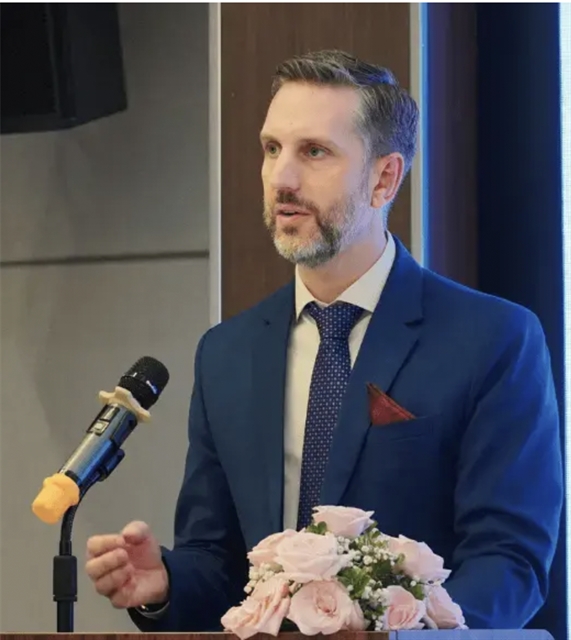
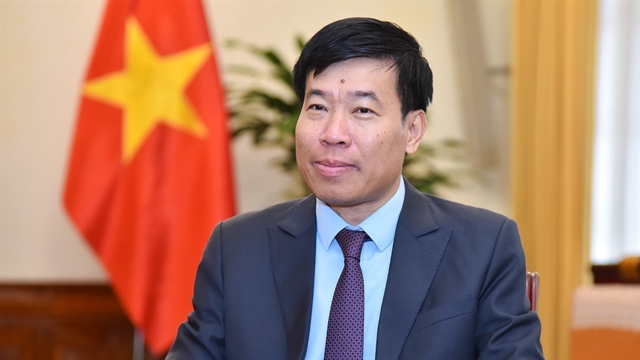
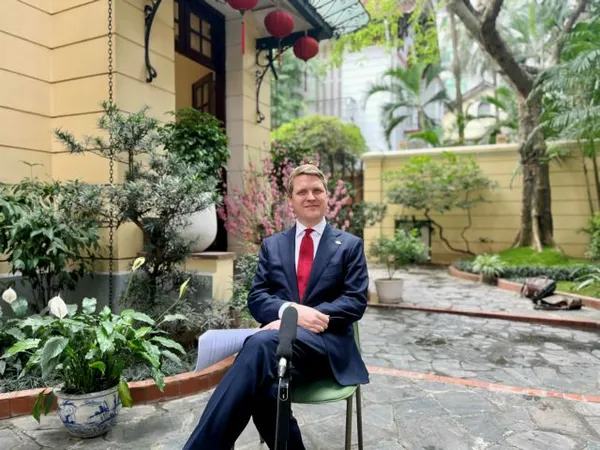

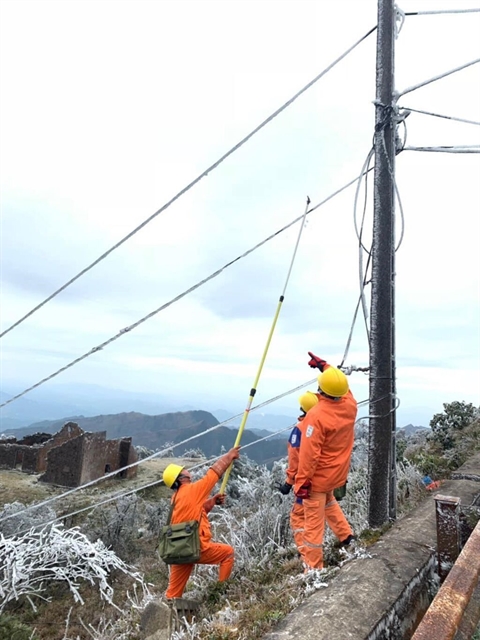

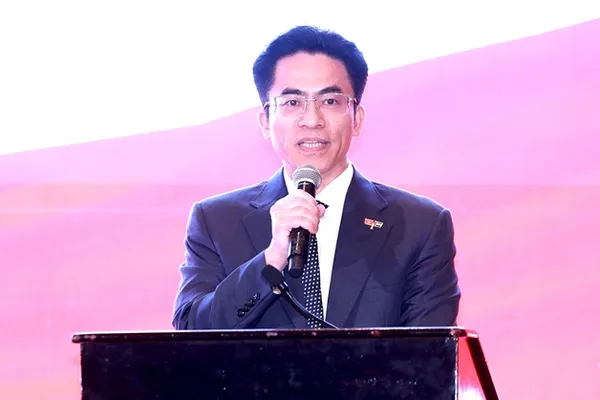
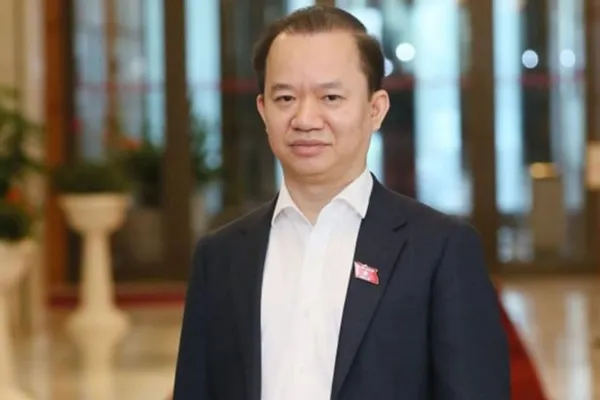
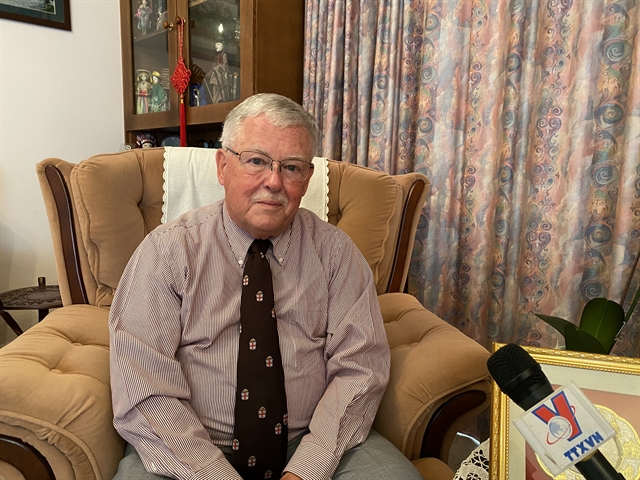
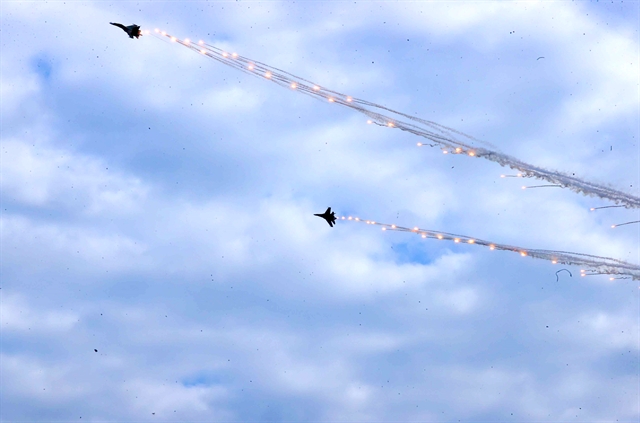
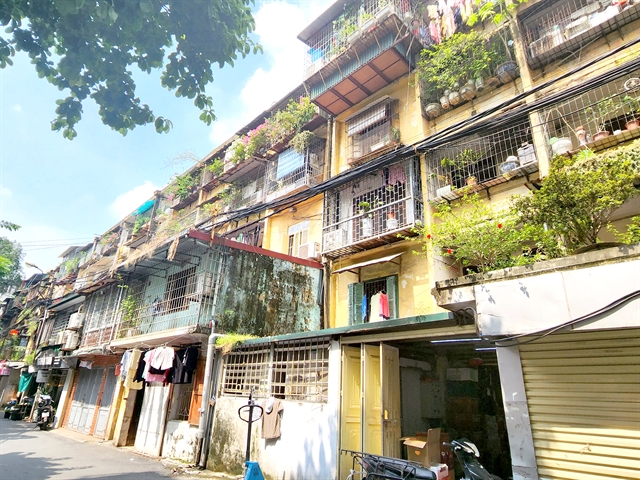
.jpg)
